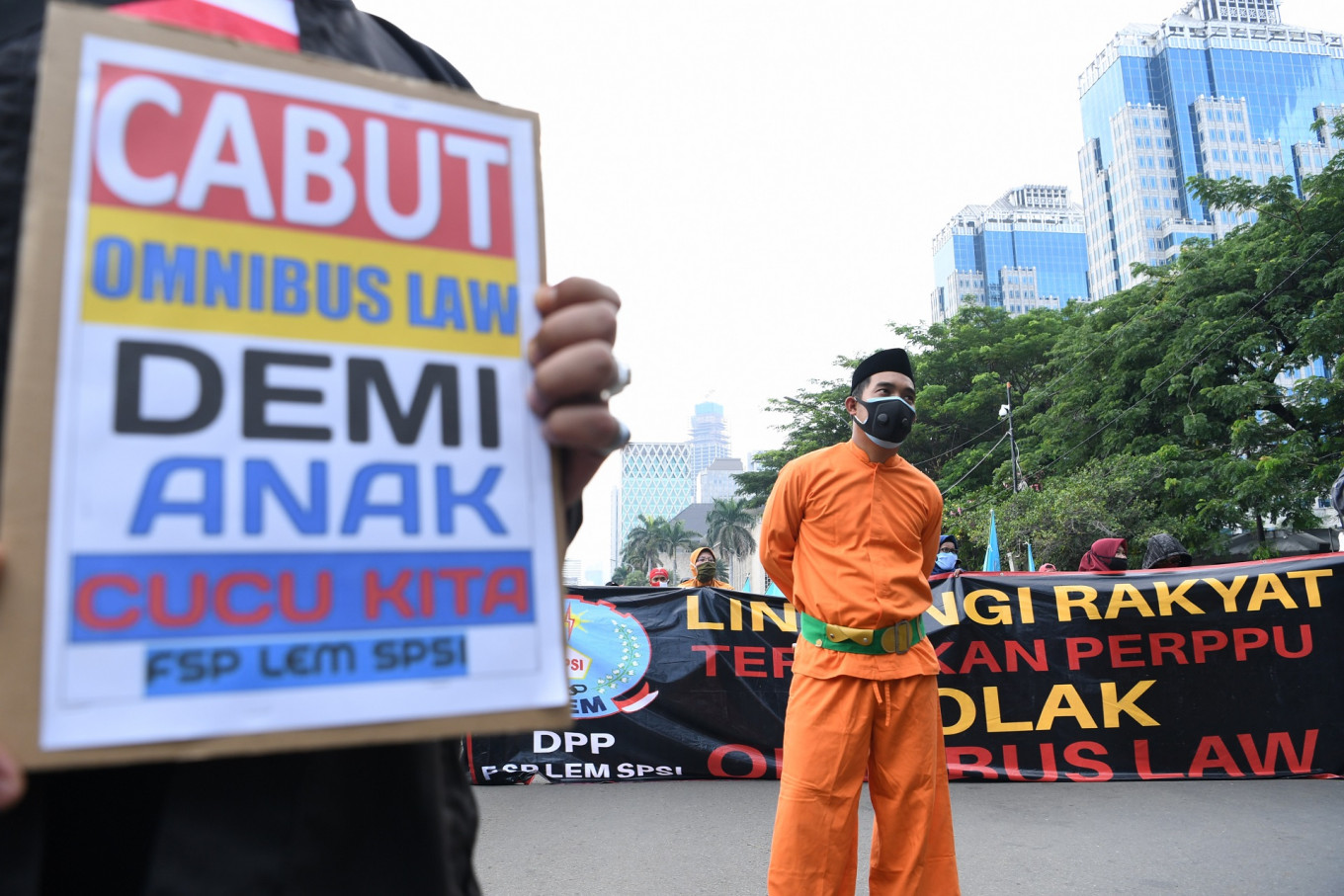Government issues jobs law rules as legal challenges lag
Authorities preparing at least four labor regulations
Change Size

T
he government has issued dozens of implementing regulations for the Job Creation Law to specify its standards and requirements, bringing radical changes to the country’s labor system, while the Constitutional Court delays hearing legal challenges to the law to focus on election disputes.
On Feb. 20, the State Secretariat announced that President Joko “Jokowi” Widodo had signed 45 government regulations and four presidential regulations for the implementation of the law. These regulations covered a number of topics, including labor issues.
According to a list on uu-ciptakerja.go.id, a government website, authorities prepared at least four regulations on labor: a regulation on foreign workers, on workers’ relations with employers, on workers’ remuneration and on the unemployment fund (JKP).
The four issues were previously regulated in the 2003 Manpower Law, one of the 73 laws amended by the Job Creation Law. The government has insisted that the changes are necessary to improve the business climate in the country.
One of the labor issues altered by the jobs law was that of temporary workers. The Manpower Law had stipulated that business owners could hire temporary workers for up to two years under one-year contracts.
The Job Creation Law does not specify the maximum duration of a temporary work contract, but its implementing regulation stipulates that workers may be employed under such contracts for up to five years.
Read also: Govt launches 'priority list' to jack up investment in key industries
The jobs law also allows labor-intensive industries to disregard regional minimum wages and use separate minimum wage calculations determined by the governor of the region of operation. The implementing regulations are expected to outline the details of this calculation.
The newly issued government regulations also stipulate provisions for the JKP. Under the social security program, the Health Care and Social Security Agency (BPJS) will share the burden of severance payments with employers. The BPJS will be responsible for these shared payments as long as workers or employers pay the premiums.
The Job Creation Law has drawn ire from the public, as critics believe many of its provisions undermine labor rights. The legislation prompted protests on the streets and online in 2020, when the House of Representatives passed the bill into law.
In addition, a number of civil groups and labor unions filed petitions for judicial review of the law at the Constitutional Court. According to the court’s website, at least 15 such petitions have been registered.
But proceedings on the petitions have been put on hold as the court rushes to settle dozens of regional election disputes. The court aims to settle 132 disputes by late March.
The plaintiffs said they still hoped the Constitutional Court would annul the law and its implementing regulations.
“We reject the Job Creation Law, especially its provisions on labor issues. Therefore, we also reject the four derivative regulations of the law on the issues,” Confederation of Indonesian Trade Unions (KSPI) president Said Iqbal said recently.
His sentiment was echoed by Indonesian Prosperity Trade Unions (KSBSI) president Elly Rosita Silaban. She said the government and presidential regulations would only create more problems for workers.
“I predict that the implementation [of the law] will create a lot of problems, just like in 2003 when the Manpower Law was put into effect,” she added.
Read also: Key points of labor reform in omnibus bill on job creation: What we know so far
The Trade Union Rights Center (TURC) said labor unions’ dissatisfaction with the implementing regulations stemmed from their discovery that workers’ concerns had not been addressed by the regulations. One of the major concerns was a new remuneration scheme, whose effect on workers’ wages had not been scrutinized.
“The government should have announced the new scheme to the public and planned for it with representatives of the general public,” TURC director Andriko Otang said.
He added that the new unemployment provisions could reduce the benefits paid to laid off workers, as the regulation stipulated that companies would pay less in severance. Furthermore, the unemployment fund would not be immediately available.
“Based on these facts, workers still tend to view the law as accommodating only the interests of businesspeople, rather than workers,” Andriko said.
Responding to the judicial review petitions, Manpower Ministry secretary-general Anwar Sanusi said the ministry would respect legal challenges to the law.
“Filing a petition for judicial review is anyone’s constitutional right. We are preparing ourselves for the process in court,” Anwar said.









